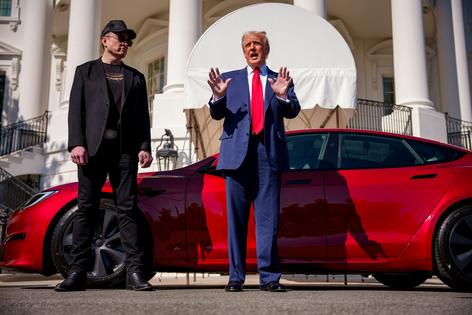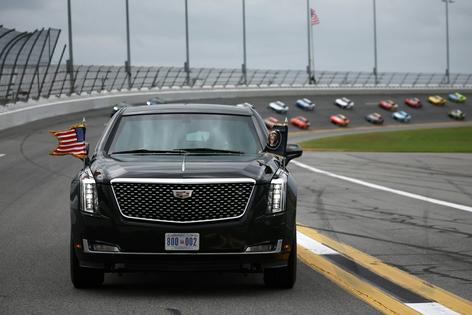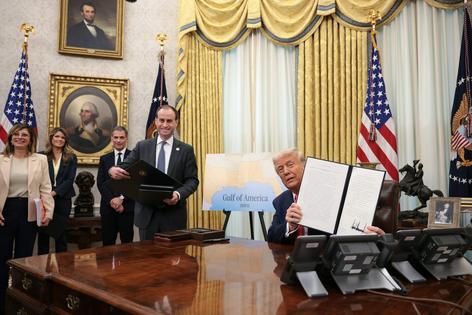Trump is not a king – but that doesn’t stop him from reveling in his job’s most ceremonial and exciting parts
Published in Political News
Heads of state are the symbolic leader of a country. Some of them, like King Charles III of the United Kingdom, carry out largely ceremonial roles these days. Others, like Saudi Arabian King Salman, are absolute monarchs and involved in governing the country’s day-to-day activities and policies. It also means that the Saudi monarch gets to do whatever he wants without much consequence from others.
In the United States, the president is both the head of state and head of government. The head of government works with legislators and meets with other world leaders to negotiate agreements and navigate conflicts, among other responsibilities.
Some presidents, like Jimmy Carter, got so bogged down in the specifics that the nighttime comedy show “Saturday Night Live” made fun of it in 1977. “SNL” spoofed Carter responding in extreme, mundane detail to a question about fixing a post office’s letter sorting machines.
As a political scientist who studies American presidents, I see that President Donald Trump loves the power and prestige that comes with being head of state, but does not seem to particularly enjoy the responsibility of being head of government.
Trump rarely talks about the often-tedious process of governing, and instead acts with governance by decree by signing a flurry of executive orders to avoid working with other parts of the government. He has also likened himself to a king, writing on Feb. 19, 2025, “Long Live the King!”
As much as Trump loves hosting sports teams and talking about paving over the White House’s rose garden in a remodeling project, he seems to begrudgingly accept the role of head of government.
Trump revels in social events where he is heralded as the most important person in the room. On Feb. 9, 2025, Trump became the first sitting president to attend a Super Bowl. A week later, he attended the Daytona 500 at Daytona Beach, Florida, where his limousine led drivers in completing a ceremonial lap.
Trump’s preference for serving as head of state and not head of government was on full display during his now infamous Feb. 28, 2025, White House meeting with Ukrainian President Volodymyr Zelenskyy.
In the televised Oval Office meeting, Trump repeatedly told Zelenskyy, “You have to be thankful.”
Trump was demanding deference from Zelenskyy to show his inferior and submissive position as a recipient of U.S. aid and military support. These are mannerisms of absolute kings, not elected officials.
The beginning of Trump’s second term in office has been filled with announcements of changes – mostly through executive actions. The Trump administration has ordered the Pentagon to stop cyber operations against Russia and fired hundreds of employees at the National Oceanic and Atmospheric Administration. The administration has also closed the Social Security Administration’s civil rights office and, among many other things, named the president chair of the Kennedy Center, a performance arts venue in Washington.
Trump has enacted policy changes almost exclusively through executive orders, instead of working with Congress on legislation.
Executive orders do not have to be negotiated with the legislative branch and can be written by a small team of advisers and approved by presidents. Within the first six weeks, Trump has signed more than 90 executive orders. By comparison, former President Joe Biden signed 162 executive orders during his four years in office.
Many of Trump’s executive orders are being challenged in court, and some have been found to likely not be constitutional.
More importantly, Trump’s successor can turn executive orders into confetti in an instant, simply with a signature. Trump himself has signed at least two executive orders that rescind over 60 previous executive orders, mostly signed by Biden.
The fact that Trump has removed almost all of Biden’s executive orders highlights how the orders can create change for a moment, or a few years. But when it comes to long-term policy change, congressional action is needed.
Early in Trump’s first term in 2017, the administration planned themed weeks called “Made in America” and “American Heroes,” for example, to emphasize changes it intended to pursue.
Trump’s staff launched, stopped and then relaunched a themed infrastructure week seven times in 2019. This happened after Trump repeatedly derailed infrastructure events to focus on a more interesting event or topic, ranging from defending his comments that seemed to suggest support for white supremacists to discussing the reboot of Roseanne Barr’s sitcom.
In his second term, Trump has farmed out many head of government tasks to other people, notably billionaire Elon Musk, who is leading the new so-called Department of Government Efficiency. By mid-February 2025, Trump gave Musk, who holds the title of special government employee, oversight for hiring decisions at every governmental agency.
But as DOGE has initiated widespread cuts at different government agencies and offices in an effort to trim government waste, Musk has reportedly clashed with Trump’s cabinet members. This includes Secretary of State Marco Rubio, as well as other independent agencies funded by Congress.
Government agencies, funding recipients and others are pushing back against the cuts and at times are succeeding in getting court rulings that halt the dismissal of government workers, or reinstate other workers at their jobs. Trump also seems to have abdicated most responsibility of bureaucracy to others by allowing Musk’s team unprecedented access to sensitive government programs and documents that include people’s personal information.
Absolute kings, queens, emperors and dictators are heads of state who demand obedience because they hold the nation in their grip.
Presidents from elected democracies may, as in the case of the U.S., have a ceremonial aspect to the job, but it is only a part of it. The people democratically elect American presidents to serve everyone and provide the best government possible.
This article is republished from The Conversation, a nonprofit, independent news organization bringing you facts and trustworthy analysis to help you make sense of our complex world. It was written by: Shannon Bow O'Brien, The University of Texas at Austin
Read more:
Tyrannical leader? Why comparisons between Trump and King George III miss the mark on 18th-century British monarchy
Trump’s defiance of a federal court order fuels a constitutional crisis − a legal scholar unpacks the complicated case
Donald Trump’s nonstop news-making can be exhausting, making it harder for people to scrutinize his presidential actions
Shannon Bow O'Brien does not work for, consult, own shares in or receive funding from any company or organization that would benefit from this article, and has disclosed no relevant affiliations beyond their academic appointment.


































































Comments